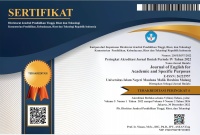EXPLORING TEACHERS AND STUDENTS’ PERSPECTIVES TOWARD NEGOTIATED SYLLABUS IN ENGLISH LEARNING FOR SENIOR HIGH SCHOOL
Abstract
Designing language syllabus is one of the important processes in the English language teaching contexts. Ensuring both teachers and students’ needs what and how their teaching and learning are applicable, negotiated syllabus can be proposed in teaching-learning processes. This study aims to find the teachers' and students' perspectives to determine whether aspects of the syllabus may be negotiable. Qualitative descriptive is used in this research. The participants involved were four English teachers and twenty students. Data were collected by using a questionnaire in the form of open-ended questions. The syllabus aspects that may be interested to negotiate according to Boon (2011) are course content, lesson aims, sequencing, material, homework, evaluation, methodology, groupings, and error correction. Both teachers and students believe the eleven areas could be negotiated. However, there are some debates in several areas. According to some teachers’ perspectives, the area of material, homework, evaluation, and error correction are not needed to be negotiated. Besides, according to some students, the area of course content, lesson aim, sequencing, material, grouping, and error correction are the teachers’ responsibilities.
Full Text:
PDFReferences
Boon, A. (2011). The negotiated syllabuses: Do you want to? In Case studies in language curriculum design (1ed), J. Macalister. New York: Routledge, pp.166-177.
Brown, H.D. (2000). Teaching by principles: An interactive approach to language pedagogy, Second Edition. London: Pearson-Longman.
Creswell, J.W. (2012). Educational research: Planning, conducting, and evaluating quantitative and qualitative research (4th ed). USA: Pearson Education.
England, N. (2017). Developing an interpretation of collective beliefs in language teacher cognition research. TESOL Q., vol. 51, no. 1, pp. 229–238.
Khosiyono, B.C.K, Pardjono, & Priyana, J. (2019). Teachers’ Perceptions towards the use of maritime English textbooks in vocational School. In THE JOURNAL OF ASIA TEFL Vol. 16, No. 3, Fall 2019, 1042-1050http://dx.doi.org/10.18823/asiatefl.2019.16.3.21.1042
Lambert, C.E. & Lambert, V.A. (2012). Qualitative descriptive research: An acceptable design. Pasific International Journal of Nursing Research Vol 4, 255-256.
Montazeri, M., Fekri, N. & Hamidi, H. (2015). Negotiated syllabus: A realization of learner autonomy. Journal of Language Teaching: Theory and Practice, 1 (1), 9-14.
Nation, L.S.P & Macalister, J. (2010). Language curriculum design. New York: Routledge Taylor & Francis Group.
Richards, J.C. (2001). Curriculum development in language teaching. New York: Cambridge University Press.
Smallman, S. (2020). The Negotiated Syllabus: How to Create Community in Online International Studies Classes. International & Global Studies Faculty Publications and Presentations. 47.https://pdxscholar.library.pdx.edu/is_fac/47
DOI: https://doi.org/10.18860/jeasp.v4i1.12617
Refbacks
- There are currently no refbacks.





Editorial Office:
Pusat Pengembangan Bahasa
Program Khusus Pengembangan Bahasa Inggris (PKPBI)
Universitas Islam Negeri Maulana Malik Ibrahim Malang
Gedung C lantai 1
Jl. Gajayana No 50 Kota Malang, Jawa Timur, Indonesia
Kode Pos 65144, Telp/Fax : (0341) 570872
Email: jeasp@uin-malang.ac.id







